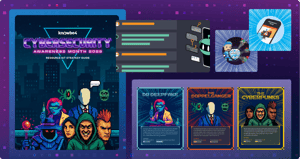Our login credentials of a username and password are sometimes all that stands between our personal identifiable information and cybercriminals. Count Hackula could be waiting in the shadows to bite on your weak or reused password. Cybersecurity Awareness Month is the perfect time for a reminder of the importance of best practices when it comes to passwords.
Here are some reminders:
Never reuse a password: Seriously, never. If one of your passwords finds itself in a data breach, then the cybercriminals can access more than one of your logins. It is okay to reuse a username. You must have a unique password for every single login.
Create strong passwords (passphrases): Would you believe people still use ‘123456’ and ‘Password’ as their passwords in 2023? Might be hard to believe, yet it is true. Please ensure that you create unique passwords with length and complexity. For example, Hum@N3rr0rC0nc&ur3D or D@nTCl1cK0n$h*t (make sure you do not use a common phrase, as cybercriminals are clever and they will figure it out). This is great if you only have a few passwords to remember. The average user has approximately 50 logins with 50 unique, long and complex passwords. How good is your memory?
Get a password manager: If you have more than 20 login combinations of usernames and passwords, get yourself a password manager tool so you only need to remember one strong passphrase. Plus, your whole family can use their own password vault within the password manager. There are many to choose from, and you can start your research here.
Enable Multi-Factor Authentication (MFA) with as many logins as possible. MFA gives you a second layer of authentication and protection from cybercriminals. Once you have entered your username and password (first authentication), a second authentication is required to access your account or app. There are a few options when it comes to MFA. The best choice for most of us is to use a third-party authenticator app such as Google Authenticator or Microsoft Authenticator.
What about kids and seniors? It is okay for this cohort to use a password book to keep track of their username and passwords, as they usually do not have too many in play at any given time. Never keep passwords on your devices in any form!






